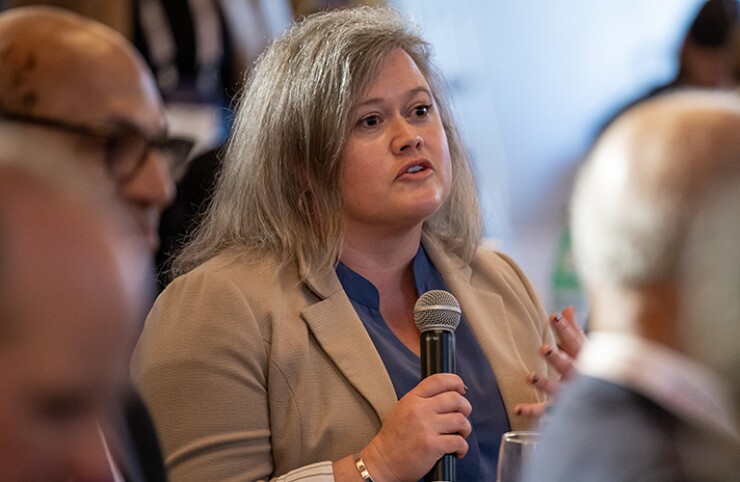Muni market’s Washington priorities heading into post-election Congress
3 min read

Municipal market advocates are urging the U.S. Treasury Department to fill a long-vacant position for an in-house municipal market expert as Washington heads into a key tax policy discussion next year.
“If we’re about to have another round” of tax talks “and there’s no one in Treasury who can be a resource of information about the muni market, then there’s going to be a real problem,” said Emily Brock, federal liaison at the Government Finance Officers Association, speaking Wednesday at The Bond Buyer’s Southeast conference. Treasury has been without a specialist on muni finance tax issues since
“We’re advocating for that position to be filled and hopefully we’ll have someone before 2025,” Brock said.
Donna Alberico
Staffing the spot is one of the top three Capitol Hill priorities outlined by Brock and Leslie Norwood, managing director and associate general counsel of the Securities Industry and Financial Markets Association.
Educating federal elected officials about the complexity and the volume of the municipal market is another top priority, as is “storyboarding” — highlighting to policy makers at least two projects from every Congressional district that have been “built by bonds,” Brock said.
Congress will focus on hammering out a new tax deal next year as
The House Ways and Means Committee has set up 10 “committee tax teams,” each of which will address a key TCJA tax provision that’s set to expire. SIFMA will be focused on meeting with each team, Norwood said, as well as continuing to “advocate on issues important to our broker-dealers,” like the tax-exemption and advance refunding.
“One big challenge is the amount of advocates that we’ve had in Congress that will be retiring or no longer running for re-election,” Norwood said. “We’ve had a stable of former state and local officials in Congress we could go to that were familiar with municipal bonds and how infrastructure is funded, and I feel like we’re losing some key advocates.”
As lawmakers look to find “pay-fors” for their tax plans, one threat is attempted claw-back of unobligated federal funds sent out as part of pandemic stimulus grants, Brock said.
“That’s causing a little bit of consternation on our part,” she said, adding that many issuers have not spent all of their pandemic funds. “There’s a lot more things at stake now for the muni space that’s going to come to the fore.”
Meanwhile, tools like tax credits built into the Inflation Reduction Act to subsidize clean and renewable energy projects have seen
“The Congressional intent with BABs was noble, but BABs have not been noble, they’ve been a pain for issuers across the country” due largely to the constant sequestration cuts, Brock said. “You’ve got to give issuers a little grace here, they’re coming off of
Norwood noted that Congress built “sequestration proofing into the law, but with Congress anything is a gamble.” The tax credits are “an interesting tool,” she added. “But the market depends on issuers being comfortable with the product, and if issuers don’t want to use the products, it’s not going to fly.”







